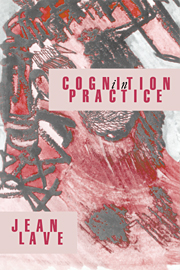Book contents
- Frontmatter
- Contents
- List of figures
- List of tables
- Preface
- 1 Introduction: psychology and anthropology I
- PART I THEORY IN PRACTICE
- PART II PRACTICE IN THEORY
- 5 Inside the supermarket (outdoors) and from the veranda
- 6 Out of trees of knowledge into fields for activity
- 7 Through the supermarket
- 8 Outdoors: a social anthropology of cognition in practice
- Notes
- References
8 - Outdoors: a social anthropology of cognition in practice
Published online by Cambridge University Press: 02 December 2009
- Frontmatter
- Contents
- List of figures
- List of tables
- Preface
- 1 Introduction: psychology and anthropology I
- PART I THEORY IN PRACTICE
- PART II PRACTICE IN THEORY
- 5 Inside the supermarket (outdoors) and from the veranda
- 6 Out of trees of knowledge into fields for activity
- 7 Through the supermarket
- 8 Outdoors: a social anthropology of cognition in practice
- Notes
- References
Summary
This expedition to explore the little known territory of everyday activity has been guided by a series of questions: What would happen to theorizing about cognition if investigations were moved to the sites of the activity whose interpretation was under debate? What changes in theoretical orientation would be required in order to make such travels seem sensible and of value in the first place? What further theoretical reformulations would follow from a multi-faceted approach to observation and analysis of everyday activity? The argument has been formulated as a journey from the laboratory into the everyday world. I have tried, chapter by chapter, to move the analysis, and the theory as well, out of the laboratory and the problematic that locates investigation of cognition in that setting (only), and past contradictory positions which attempt to keep one foot in the door. The concept of “context” has been shifted out of “conceptual spaces” and correspondingly, “understanding” appears to belong directly in the experienced world, in activity. The empirical investigation, broadening from laboratory to ethnographic studies and simulation experiments across settings, reached its present limits in the previous chapter, with the analysis of arithmetic practice in the supermarket.
But this analysis was not a closed one. It referred beyond itself to the sociocultural order implicated in the structuring resources that give to, and take their shape from, persons-acting, activity, and context.
- Type
- Chapter
- Information
- Cognition in PracticeMind, Mathematics and Culture in Everyday Life, pp. 170 - 190Publisher: Cambridge University PressPrint publication year: 1988
- 1
- Cited by



